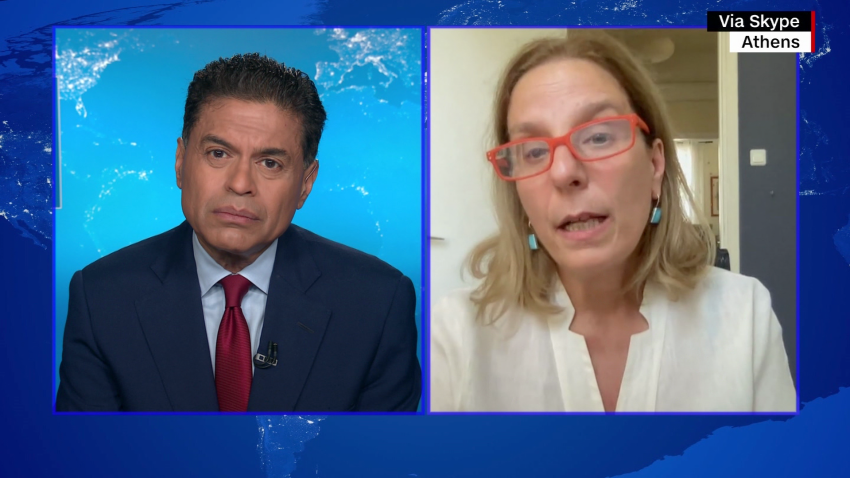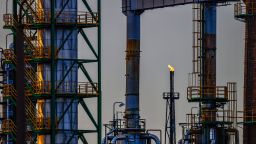Editor’s Note: David A. Andelman, a contributor to CNN, twice winner of the Deadline Club Award, is a chevalier of the French Legion of Honor, author of “A Red Line in the Sand: Diplomacy, Strategy, and the History of Wars That Might Still Happen” and blogs at Andelman Unleashed. He formerly was a correspondent for The New York Times and CBS News in Europe and Asia. The views expressed in this commentary are his own. View more opinion at CNN.
Ten years ago, my friend Patrice and his wife, Brigitte, installed air conditioning in their summer home in the Pyrenees mountains in southwestern France. Their son insisted and paid for it – a good thing. It’s been getting hotter every year there, and this year the temperatures hit 95 degrees Fahrenheit and stayed there as forest fires spread across the country.

In Paris, though, where temperatures broke 100 degrees several days this summer, my friends have never installed it. Their house is on a landmarked street. The bureaucratic hurdles would have been insurmountable. And now it’s less likely than ever that they’ll have a chance.
France has never embraced air conditioning with any eagerness. Now, along with Germany, Italy, Spain, Greece, Poland, indeed most of the European Union, all are facing a toxic confluence of high temperatures, higher prices for energy and a Russian threat to cut off gas supplies. Now, all are putting increasing pressure on their citizens to hold down consumption. And the efforts are getting broader, deeper and will be immediately visible to everyone – visitor and citizen alike. Each nation and a host of European companies should also be serving as a role model for the world’s second-biggest environmental miscreant – the United States.
France’s minister for ecological transition, Agnès Pannier-Runacher, issued an edict last week that shop owners who keep their street doors open with the air conditioning at full blast will be liable to pay fines of 750 euros ($765). She was, of course, quite right when she explained that this practice was “absurd” and led to 20% “more energy consumption,” according to The Guardian.
The government may also have found a steady new revenue source. Walking through neighborhoods in some parts of Paris, there’s door after door open, each with a huge exhaust vent hose from the portable air conditioner snaking out to the sidewalk – not to mention the department stores with their doors flung wide, cold air blowing into the superheated streets.
But that’s only the tip of the iceberg. In fact, the largest glacier in the southern Alps, atop Mont Blanc, has lost half its mass – “a giant on borrowed time,” Le Monde headlined on its front page Saturday. Combined with forest fires that have incinerated large stretches of Europe, reportedly almost four times the 15-year average, environmental panic is all around.
So in France, the government is going to demand concrete measures. Between 1 a.m. and 6 a.m., there’ll be no outdoor illuminated advertising – violators risk a fine of about 1,530 euros ($1,562). During those same overnight hours, no inside temperature can be above 66 degrees in winter or below 79 degrees in the summer. In parking garages, there can be no lights at all, except when a car or a person arrives or departs.
Indeed, the government is already preparing sweeping “load-shedding” plans for the winter ahead as are a host of major corporations. Carrefour, the giant chain of 1,700 supermarkets, plans to start roasting its chickens an hour earlier at 7 a.m. to smooth demands on the electric grid, according to the Financial Times.
As it happens, France is the best positioned of most countries in Europe to cope with the carbon crisis. Energy has long been cheap in France – far cheaper than in the United States – largely a tribute to the proliferation of nuclear-generating plants, where it gets most of its electricity. And French President Emmanuel Macron announced plans earlier this year to build up to 14 new nuclear reactors.
Our monthly electric bills in our Paris studio apartment average 36 euros ($37) a month year-round, including electric heat during the winter. We bought a small portable air conditioner a couple of years ago, but we’re the only Americans in our 1870s-vintage apartment building, so the only ones with any air conditioning at all. The French government’s Agency for Environment and Energy Control estimates that lowering a home thermostat by 1 degree during the winter can save 7% on heating bills.
Italy is also preparing emergency plans that includes turning off lights that illuminate monuments, closing commercial buildings at 7 p.m. and implementing maximum cooling levels in summer and minimal heating in winter in all public buildings except hospitals. But with Prime Minister Mario Draghi’s recent resignation and the government in chaos, one can only hope these measures will kick in.
It may be less of a problem in Spain, where Prime Minister Pedro Sánchez actually doffed his necktie and urged everyone to go tieless to cut back on air conditioning.
The biggest problems are in regions staring down the twin problem of high energy use and deep dependance on natural gas from Russia. There, in some respects fear of a winter ahead with dwindling energy supplies seems to be trumping fear of damage wrought by excessive carbon use this summer. A dozen EU countries are especially affected by their reliance on gas supplies from Russia, exceeding even the European average of 40% dependency, and which explains at least some of their efforts at conservation.
Germany is going beyond most of its neighbors to break the addiction to Russian gas. The city of Hanover is turning off all hot water, even for showers, in every public building, the BBC reports, while there’ll be no heat at all in such buildings from April through September. Berlin reportedly may even turn off nonessential traffic lights at night. Germany moved to its second level of a three-stage emergency gas plan in June, proposing four floating liquefied natural gas import terminals and two permanent offshore sites, with two online by the end of this year, according to S&P Global Commodity Insights.
Meanwhile, France is planning to restart its coal-fired power plant in Saint-Avold in the coal region of Moselle in the eastern part of the country, according to Le Monde. Shuttered in March, it’s now slated to reopen October 31. “It always comes down to the same thing, which is saying that you don’t want to cut your energy, but you also want to end polluting activities,” Le Monde quoted Macron as saying on July 14 while repeating his pledge to close all the nation’s coal-fired plants. France also reportedly wants to build a floating LNG terminal in its northern port of Le Havre and two massive floating wind farms off its Mediterranean coast.
The entirety of the 27-member European Union, except Hungary, has ratified a 15% reduction in gas usage over the winter – voluntary for the moment, but if Russia follows through on suggestions it might shut down all gas supplies, could become mandatory. In short, Russia is effectively forcing its biggest customer – the EU – to undertake dramatic reforms immediately that threaten to alter the need for its principal export permanently.
The question, of course, is how much support for these kinds of measures there will be when the weather, especially across northern Europe, pivots sharply later this fall and into a brutal winter when there is simply not enough gas, especially from Russia, to go around. How long that game of chicken can go on may be the biggest question facing both ends of the gas supply lines. It is essential, on so many levels, for these nations to stand firm against Russian aggression and its attempts to manipulate global markets to its own benefit.




